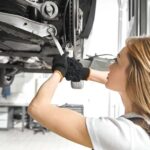The Importance of Routine Car Maintenance for Longevity and Performance
Introduction
Owning a car is more than just a convenience; it’s a significant investment that requires proper care and maintenance to ensure it serves you well over the years. Whether you’re a casual driver or an auto enthusiast, understanding the importance of routine car maintenance can help you maximize your vehicle’s longevity and performance. In this blog post, we’ll delve into why regular maintenance is crucial, the benefits it offers, and how you can build a maintenance schedule that keeps your car running smoothly.
The Benefits of Routine Car Maintenance
Longevity
One of the most compelling reasons for routine car maintenance is to extend the lifespan of your vehicle. Regularly servicing your car and attending to minor issues promptly can prevent them from escalating into major problems.
Performance
A well-maintained car performs better in terms of fuel efficiency, acceleration, handling, and braking. Routine checks and tune-ups ensure that all systems operate optimally, giving you a smoother and more enjoyable driving experience.
Safety
Your safety on the road is directly linked to the condition of your vehicle. Routine maintenance checks, such as brake inspections and tire rotations, are essential to avoid accidents and ensure that your car is always in peak condition.
Environmental Benefits
A well-maintained car is better for the environment. Regular servicing helps to reduce emissions and improve fuel efficiency, making your vehicle more eco-friendly.
Key Maintenance Checks Every Car Owner Should Know
Oil Changes
Oil is the lifeblood of your car’s engine. Regular oil changes are crucial to keep the engine running smoothly and to prevent excessive wear and tear. Most manufacturers recommend changing the oil every 3,000 to 5,000 miles.
Tire Rotations
Tire rotation involves moving the tires to different positions on the car to ensure even wear. This extends the life of your tires and improves your car’s handling and fuel efficiency.
Brake Inspections
Brake systems should be inspected regularly to ensure they are functioning correctly. This includes checking the brake pads, rotors, and fluid levels. Neglecting brake maintenance can lead to disastrous consequences.
Fluid Checks
Your car relies on various fluids, including coolant, transmission fluid, and brake fluid, to function properly. Regularly checking and topping off these fluids can prevent overheating and other issues.
Battery Maintenance
A healthy battery is essential for your car’s electrical system. Regularly check for corrosion and ensure that the battery terminals are clean and secure.
Filter Replacements
Air and fuel filters need to be replaced periodically to ensure that your engine receives clean air and fuel. Clogged filters can reduce performance and increase emissions.
The Cost of Neglecting Maintenance
Neglecting routine maintenance can lead to costly repairs and even complete engine failure. The financial burden of fixing a major issue far outweighs the relatively low cost of regular maintenance. Additionally, a poorly maintained car is more likely to break down, which can be inconvenient and potentially dangerous.
Financial Consequences
Ignoring small issues like oil leaks or worn-out brake pads can lead to expensive repairs. For example, failing to change the oil can cause engine damage that might require a complete engine overhaul, costing thousands of dollars.
Safety Risks
Driving a car with neglected maintenance can be hazardous. Worn-out tires, faulty brakes, and other neglected components increase the risk of accidents, putting you and others on the road in danger.
Building a Routine Maintenance Schedule
Consult the Owner’s Manual
Your car’s owner’s manual is a valuable resource that provides recommended maintenance schedules based on your vehicle’s make and model. Follow these guidelines to keep your car in top condition.
Use a Maintenance Log
Keeping a maintenance log can help you track when each service was performed and what needs attention in the future. This can be as simple as a notebook or a digital app designed for car maintenance tracking.
Professional Services
While some maintenance tasks can be done at home, it’s crucial to consult professional mechanics for more complex checks and repairs. Regular visits to a trusted auto service center can help you stay on top of your car’s needs.
Emerging Technologies in Car Maintenance
Diagnostic Tools
Modern cars come equipped with advanced diagnostic tools that can alert you to potential issues before they become serious problems. These tools can be accessed via onboard computers or smartphone apps, providing real-time data about your vehicle’s health.
Predictive Maintenance
Predictive maintenance uses data analytics and machine learning to predict when a component is likely to fail, allowing for proactive repairs. This technology is becoming increasingly popular in the automotive industry, offering a smarter approach to car maintenance.
Automated Service Reminders
Many auto service centers now offer automated service reminders via email or text message, ensuring you never miss an important maintenance check.
Conclusion
Routine car maintenance is not just a good practice; it’s a necessity for ensuring the longevity, performance, and safety of your vehicle. By staying proactive and following a regular maintenance schedule, you can enjoy a reliable and efficient car for years to come. Remember, investing in routine maintenance today can save you from costly repairs and potential safety hazards down the road.
Take the first step towards a well-maintained vehicle by creating your maintenance schedule today. Your car—and your wallet—will thank you for it.

